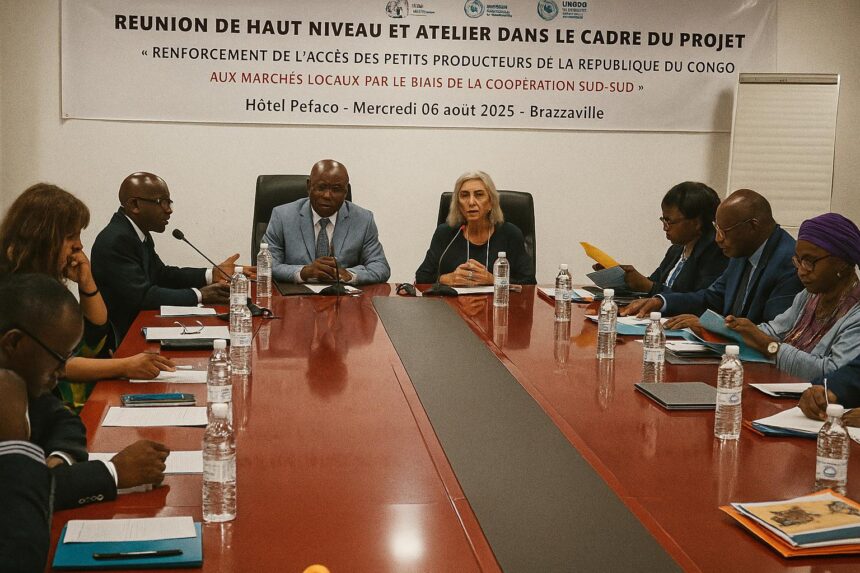Policy Momentum Ahead of 2025 Adoption
The Republic of Congo has entered the technical drafting phase of a national school canteen policy that authorities intend to adopt before the close of 2025. The proposal, announced in Brazzaville by World Food Programme representative Gon Myers, would shift management and financing of school meals from donor dependency toward full state stewardship. Congolese officials frame the initiative as an institutional response to the 2023 African Union Year of Nutrition and to the United Nations Sustainable Development Goals, notably SDG 2 and SDG 4, which respectively target zero hunger and quality education.
Government planners point to encouraging indicators. According to the Ministry of Pre-School, Primary and Secondary Education, pilot canteens increased average enrolment in participating schools by nine per cent over two academic years, while absenteeism fell by almost one third. The ministry argues that embedding those gains in law is the logical next step.
South-South Synergies with Brasília
Architects of the policy draw heavily on the recently concluded South-South cooperation project, evocatively titled “Semence d’Avenir”. Funded by Brazil and facilitated by the WFP Centre of Excellence against Hunger, the venture paired technical teams from Brasilia and Brazzaville to adapt Brazil’s celebrated National School Feeding Programme to Central African realities. Brazilian vice-minister for international cooperation Ana Suza told delegates that “direct public procurement from family farmers has proven to be a social inclusion engine at home; its principles travel surprisingly well across the Atlantic”.
Over twenty-five Congolese schools—ten of them applying the Brazilian-inspired reference manual in full—tested a menu cycle anchored in cassava, plantain and locally produced beans. Manuals on agricultural policy, small-holder procurement and citizen oversight, formally handed to the Congolese side at the August evaluation workshop, now constitute the documentary backbone of the forthcoming national decree.
Local Agriculture at the Heart of the Canteen
The draft policy stipulates that at least 30 percent of the overall food basket will originate within a 50-kilometre radius of beneficiary schools, a clause designed to stimulate rural markets and insulate supply chains from global price turbulence. Ten cooperatives—spanning the Plateaux, Niari and Pool departments—have already diversified crop calendars to synchronise with school terms, an adjustment agronomists regard as a tangible productivity gain.
Dr Pitchou Prudence Banga-Mboko, director of basic education, summarised the rationale in deliberately systemic terms: “We are no longer discussing charity lunches; we are engineering a platform where the classroom, the field and the local economy converse.” The language resonates with the African Development Bank’s 2024 report on value-chain integration, which singles out institutional procurement as a lever for rural transformation.
Managing the Transition to State Ownership
A memorandum signed between the WFP and the Ministry of Education envisages a gradual budget re-alignment, beginning with a ten-per-cent annual increase in domestic allocations matched by a calibrated reduction in external grants. Officials insist that financial prudence rather than abrupt self-reliance will guide the handover, citing Ghana and Kenya as precedents where donor exit was sequenced over half a decade.
Fiscal analysts at the Congolese Ministry of Finance estimate the recurrent cost of universal coverage at roughly 0.4 per cent of GDP—well within regional benchmarks if accompanied by targeted tax incentives for small-scale millers and transporters. Parliamentary committees have already requested an actuarial review to guarantee sustainability, reflecting the legislature’s growing appetite for evidence-based budgeting.
Diplomatic Ripples and Regional Food Security
Beyond the classroom, Brazzaville’s move carries diplomatic weight. By foregrounding South-South collaboration rather than traditional North-South aid, the initiative aligns with President Denis Sassou Nguesso’s stated commitment to diversified partnerships and African solutions to African challenges. It also dovetails with the Economic Community of Central African States’ 2025 Compact on Human Capital, positioning Congo as a norm-setter in the sub-region.
Observers from the World Bank argue that school feeding policies often become soft-power instruments, attracting exchanges in agritech, nutrition science and public procurement. Congo’s forthcoming policy could thus function as a convening device for triangular cooperation, where external partners contribute technology while ownership remains local. If the timetable holds, the first nationwide meals under exclusively Congolese management could be served at the opening of the 2026 school year—proof, perhaps, that diplomatic cuisine can nourish both pupils and geopolitics.





















